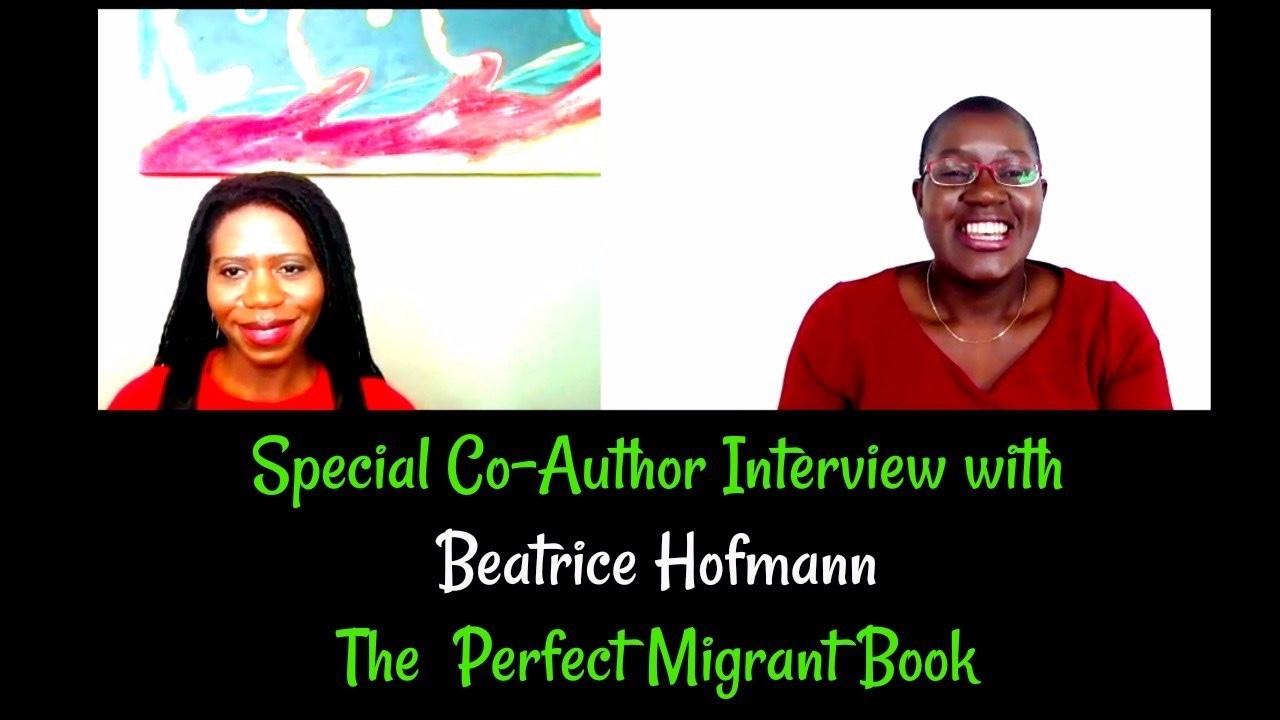Learning Each Step of the Way by Beatrice Hofmann

How to Identify Opportunities and Benefit from them.
The Perfect Migrant Book
Here is the script from the interview with Beatrice Hofmann, Her chapter is the first in the book and it is titled LEARNING EACH STEP OF THE WAY: How to Identify Opportunities and Benefit from them. You can view the full YouTube interview here
“I feel a great level of accomplishment. I know, there is so much more I have to share with the world, and I think this little book has only been the cornerstone, the rock that gets things rolling if you will.”
Tell us about yourself?
My name is Beatrice Hofmann. I am a beauty and wellness therapist, I have been practising my profession for 11 years now. I have been running my own business since 2010. I live in Germany, and I have been here for 19 years. I was born and raised in Uganda. I enjoy sharing my experience and exchanging of information with people from all walks of life. I am a mom, and I have one daughter.
What prompted you to write a chapter in the Perfect Migrant Book?
I felt my story as a migrant was just right for the perfect migrant.
Migration is an issue which polarised our society. Every single day in the media or politics migration, immigration or refugees are seen as a problem. I wanted people to know that migrants actually have a lot to bring to the table. Not only do some of them arrive in their new countries as highly educated, but also bring a different vantage point which is crucial to creating something new. People from different cultures create a unique cross-cultural “win-win” situation. I hope that I can help raise awareness for the multi-dimensional problems such as language, culture, lack of inclusion, integration and so forth, that migrants face among the native people. At the same time lend encouragement and give tips to fellow migrants how to avoid certain pitfalls like stay only within one’s own community, limiting their ability by following the advice of naysayers and jealous people.
When did you realise that you could write?
I have been taking notes of daily occurrences and situations for many years now. If something captures my attention, I like to reflect on it and at times I do conduct further research on it. I think it’s great that in this day and age with the internet and even public libraries, knowledge is readily available for everybody. You don’t necessarily need to spend a lot of time and money and go to university.
What was your greatest fear about writing? How did you overcome it?
The idea that some close relations of mine (my daughter, my parents and siblings) might feel hurt about some of the things I address. Judging by the overwhelmingly positive feedback I’ve received so far, I have to say that people empathise with one’s stories if they can relate to a person or a situation.
The most important thing seems to be that one approaches the subject matter with absolute sincerity, then, I believe, people will be drawn to a story. Any doubts or resentments I’ve had about telling something or not, I eliminated by discussing with some of my closest friends.
Once I got a strong feeling from their feedback that the ideas were worth writing about, I went for it.
What do you plan to do with the story you have written?
I aim to use for motivational speaking, translate it to German for German readers and also take part in literature clubs.
What would you say has been the unexpected benefit of writing in the book?
I have experienced a self-healing. I have made peace with myself, and those who contributed to my setbacks and struggles, since all these years I was haunted, now I’m happier. My friends who read my draft could identify with my story
How do you feel now after writing?
I feel a great level of accomplishment. I know, there is so much more I have to share with the world, and I think this little book has only been the cornerstone, the rock that gets things rolling if you will.
What is your writing process like?
In the case of this book, it started with several brainstorming sessions about situations that occurred in my life that for one had a direct impact on the path my life would be taking and for two that had a connection to my life as an African migrant in Germany. After brainstorming, I would write down the basic ideas of the chapters.
Next would be to flesh out the paragraphs to give them life and make them clearly comprehensible for the reader, at last, I would usually look for some quote from myself or other people who would point the reader to the main ideas of the chapter.
At times though, the quotes already came to my mind while I was writing down the ideas or fleshed out versions of the chapters.
Once I felt I had relatively well completed my book, I gave it to two of my friends whose opinion I trusted. With their feedback I went through a final revision and that it was done.
What advice do you have for someone who is thinking of writing but hasn`t decided to do so?
I would say;
Go for it!
Do it today!
Don’t procrastinate!
Be honest with yourself and do the best job possible, your own thought process!
What are the common fears for aspiring writers?
People always ask themselves;
Am I good enough at writing my story?
Am I a good writer?
Am I embarrassing myself or my family?
Stay connected with news and updates!
Join our mailing list to receive the latest news and updates from our team. You'r information will not be shared.
